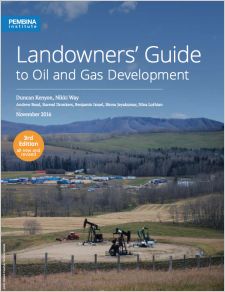Alberta Landowners Guide, Legal Assistance
 3rd edition | |
| Authors: | Duncan Kenyon, Nikki Way, Andrew Read, Barend Dronkers, Benjamin Israel, Binnu Jeyakumar, Nina Lothian |
|---|---|
| Publisher: | Pembina Institute |
| Publish Date: | October 2016 |
| PDF Download: | [Landowners' Guide] [Landowners' Primer] |
| Initiation Phase | |
| Exploration Phase | |
| Development Phase | |
| Pipelines and Other Infrastructure | |
| Environmental Impacts | |
| Abandonment and Reclamation | |
| Compensation, Rights, and Hearings | |
| Appendices Alberta Energy Regulator Other Alberta Departments Other Resources Legal Assistance Energy Industry Associations Provincial Non-profit Organizations Surface Rights and Local Groups Responsible Energy Development Act AER Oil and Gas Related Legislation AER Energy Related Legislation Other Provincial Acts Documenting Costs Glossary of Terms | |
Contents
Contacts
This chapter provides contact information for lawyers, laboratories, industrial associations and community groups.[1] Within each main section, the individual organizations are listed in alphabetical order. While engaging effectively with industry and the regulators can appear to be a daunting challenge, accessing the experience and expertise of others who have professional training or who have dealt with similar issues can be an invaluable source of advice and support.
Lawyers, Expert Witnesses and Technical Assistance
Lawyers or landowner representatives
In many cases a landowner negotiates directly with a company, but sometimes it can be helpful to engage a lawyer or landowner representative who is familiar with surface rights issues. Landowner representatives may be certified land agents, or other professionals with experience negotiating on these issues. Several years ago the provincial government changed land agent legislation to allow farmers and ranchers to hire professionals who were not land agents.
If a situation is complex or if negotiations break down and you plan to present at a
hearing, you may wish to engage a lawyer and/or expert witnesses. This is especially
common for cases brought before the AER, and some interveners also like to have a
lawyer represent them at a Surface Rights Board hearing.
It is best to find a lawyer and/or expert witnesses who are experienced in energy issues
and in the hearing process. Unfortunately, there is no central resource to find experts
and lawyers, so you may have to ask around your networks, contact a local surface rights
group or synergy group and search online. There are several law firms in Alberta that
practice environmental or surface rights law.
You could also read some of the AER hearing decision documents and see which lawyers
and expert witnesses were involved. These are listed at the beginning of each decision.
The local residents are identified as “principals” and listed in the left-hand column.
Where they are represented by someone, that name is given underneath. All recent
decisions are published on the AER’s website.[2]
While the highest priority in selecting professional assistance is to choose someone
with experience in energy hearings, hiring professionals who are located near you can
help to reduce costs and facilitate communication.
Mediation and Arbitration
In many energy-related cases, the AER will provide assistance if companies or individuals would like a third party mediator instead of the AER staff mediator (see Working with the Alberta Energy Regulator). The AER keeps a list of companies that provide appropriate dispute resolution services and also lists on their website individuals who undertake mediation.[3] These individuals are most likely to have an understanding of energy issues.
Alternatively, you may wish to contact the ADR Institute of Alberta (formerly associated
with the Alberta Arbitration and Mediation Society), which maintains a searchable
directory of ADR specialists in Alberta. Their website also provides more information on
the basics of mediation.
- ADR Institute of Alberta
- Toll Free: 1-800-232-7214
- Edmonton: 780-433-4881
- Fax: 780-433-9024
- info@adralberta.com
- www.adralberta.com
Laboratories
If you want to have your air or water tested, be sure to engage an accredited laboratory. The Canadian Association for Laboratory Accreditation (CALA) delivers laboratory accreditation for environmental, and petroleum testing, along with other testing services. Each laboratory is separately evaluated and accredited for specific tests. Thus, the tests that a laboratory is accredited to perform will vary from one lab to another, even within the same company. The website includes a list of accredited laboratories.
- The Canadian Association for Laboratory Accreditation
- Phone: 613-233-5300
- Fax: 613-233-5501
- www.cala.ca
Accredited laboratories are also listed at:
- The Standards Council of Canada
- www.scc.ca/en/search/palcan
Technical consultants
You may also need other environmental consulting services or technical expertise. The Environmental Services Association of Alberta is an industrial association of the major companies that provide environmental services in Alberta. The list and profiles of association members on the website may help identify companies that can provide consultants or expert advice.
- Environmental Services Association of Alberta
- #102, 2528 Ellwood Drive SW
- Edmonton, AB - T6X 0A9
- Phone: 780-429-6363
- info@esaa.org
- www.esaa.org
References
- ↑ This material is from the Pembina Institute publication 'Landowners' Guide to Oil and Gas Development, 3rd edition (2016)'
https://www.pembina.org/pub/landowners - ↑ AER, “Decisions.” https://www.aer.ca/regulating-development/project-application/decisions.html. This link has been updated since the 2016 publication; the updated link may no longer contain the original information.
- ↑ AER, “ADR Third-Party Mediators.” https://www.aer.ca/protecting-what-matters/giving-albertans-a-voice/alternative-dispute-resolution/adr-third-party-mediators.html. This link has been updated since the 2016 publication; the updated link may no longer contain the original information.
| ||||||||||||||||||||||||||||||||||||||||||||
